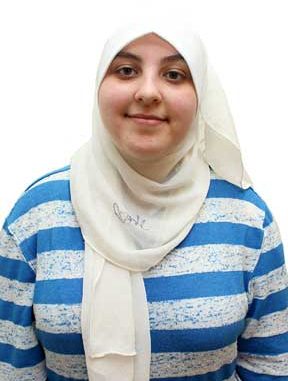
 The air here is nothing like the clean, crisp air of Tel Aviv. Here, the air is stale and suffocating. The streets have ceased to exist, and in their place are dirt roads with no real direction. The Israeli soldiers are no longer the smiling faces seen on the other side of the wall. Here, they are storming homes, demolishing buildings and tearing families apart. This is Palestine.
The air here is nothing like the clean, crisp air of Tel Aviv. Here, the air is stale and suffocating. The streets have ceased to exist, and in their place are dirt roads with no real direction. The Israeli soldiers are no longer the smiling faces seen on the other side of the wall. Here, they are storming homes, demolishing buildings and tearing families apart. This is Palestine.
“I was supposed to be going home,” said Ayat Zidan, a junior biology major. “I grew up in America, and now I was going back to see where I had come from. It was nothing like I thought. I felt like I was visiting a stranger’s house. We were always walking on egg shells.”
Zidan’s portrayal of Israel drastically differs with other descriptions of the country. In a previous guest column in The Temple News, “Taking up birthright,” Cindy Stansbury shows a completely different side of the country and its soldiers. She dismisses the atrocities that Israel has committed and instead talks about the sweet teenagers she got to hang out with.
She and the rest of the Americans on the trip were constantly accompanied by eight Israeli soldiers wherever they went. If that came as a surprise to her, what would be the appropriate reaction upon finding that, in Palestine, people are constantly restrained from going places by these armed guards?
It’s not always a guarantee to be allowed to enter or exit towns. Soldiers often turn people away with absolutely no reason given. Better luck tomorrow. Maybe then they will feel more generous.
“At the checkpoints, they pulled my little sister away and kept asking her questions. They had their guns pointed in her face. When any of the kids there didn’t answer properly, they’d shove them really hard,” Zidan said.
Palestinians are not allowed to enter all parts of their country. In fact, anyone of Palestinian descent has a “haweya,” which is like a visa that makes them no different than people born in Palestine. This means that even Palestinians born and raised in America are banned from entering Jerusalem.
“I had to lie to get in. The soldier kept asking me questions in Arabic, and I pretended not to understand. They asked me where I’m from, and I said America. I told them I was a student there. They only let me in after I showed them my Temple ID,” Zidan said.
For argument’s sake, you could say that it may be reasonable for the soldiers here to retaliate in some way if the argument had escalated alarmingly. However, there are hundreds of other cases in which there is no justification. For example, last November Israeli troops shot dead an unarmed and mentally unfit Palestinian man who approached the fence without malicious intent.
Assaulting innocent individuals is perhaps the least of their offenses. In January 2009, Israeli troops bombed United Nation schools that were used to house Palestinian refugees who were ordered to vacate their homes in the Gaza strip. Forty-three people were killed, and many of them were children. Israel’s excuse for this was that they were targeting the Islamist group Hamas, but there were no Hamas fighters in the area.
Stansbury’s article is about her trip to a new place she hadn’t seen before, but where she felt right at home. Palestinians, however, are going home only to find that they are more like visitors or strangers.
The idea of “home” in Palestine no longer exists. Houses are liable to be invaded and destroyed at any point. Losing family members to murder or arrest is such a common occurrence that it has come to be expected. The warmth and happiness found in a real home is fleeting.
Stansbury writes: “The soldiers were sweet. Yes, sweet as in nice, kind, polite, caring — fill in any other positive adjectives of your choice here.”
Perhaps this is the side of them that she was lucky enough to see. But when Israeli soldiers pointing a gun in the face of a child, or rupturing families, or wrecking their homes or keeping them from moving through their own towns, it is fair to question where the blaring signs of kindness are.
It doesn’t matter if we are pro-Israel or pro-Palestine. We are all free to have our own views on this conflict. However, every person’s birth right is to love without expecting loss, to work without having unrealistic goals and, above all, to live without constant fear. This is the definition of humanity, but this is not Palestine.
Hend Salah can be reached at hsalah@temple.edu.



Be the first to comment